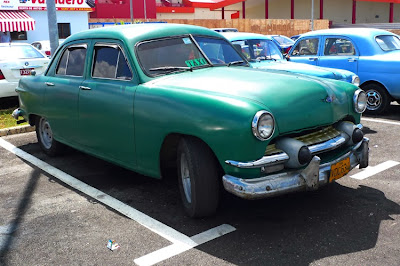Car news in Cuba: Nothing much has changed
Several news outlets got excited about the announcement this week that the Cuban government will allow "unrestricted" car imports.
This, reported the Telegraph, meant the "end of the road" for the island's vintage vehicles. Others declared it "the end of an era" – a phrase not used by most more than three or four times a week in conjunction with, well, pretty much any change anywhere.
The Agence France Press, meantime, predicted that "opening Cuba's domestic car market to imports is likely to have fateful consequences for the lovingly maintained 1950s cars on the island."
Fateful consequences do sound ominous, though not as ominous, we'll all agree, as ominous consequences, which are just a degree below dire consequences.
Reuters, rather confusingly, explained that Cubans now will be able to buy "new and used vehicles from the state without government permission," which is actually correct, though requiring some amplification.
Cuba has been loosening the rules on the fringes of its centrally planned economy, allowing, for example, citizens to operate small businesses such as restaurants and taxi services. It's doing this, however, not because the Castro government has suddenly recognized the merits of free enterprise, but as an attempt to gain some control over the black market commerce that underpins a growing shadow economy.
One of Cuba's "reforms" two years ago allowed the transfer of registered vehicles of any year, rather than just the pre-revolution cars that could always be bought and sold, plus the purchase – but only from state agencies and only with a government permit – of new and late-model vehicles brought in from outside.
Such authorizations were hard to obtain, however, and soon took on a value of their own. "The card, apart from being overly bureaucratic, became a source of speculation and illicit self-enrichment," reported the Community Party newspaper Granma.
Now no permit is required, but would-be import buyers will still be required to make the purchase through the state, and will still need to prove that their money was obtained by approved means. And, because Cuba has said pricing will be based on current values in the island's restricted used car market, they won't be finding any bargains.
The "fateful consequences" of all this?
Cuba again deregulates in the interests of more control. A few more new cars will trickle in.
And the old cars will drive on, their era far from over.
This, reported the Telegraph, meant the "end of the road" for the island's vintage vehicles. Others declared it "the end of an era" – a phrase not used by most more than three or four times a week in conjunction with, well, pretty much any change anywhere.
 |
| Mercury station wagon from 1947 or '48. |
The Agence France Press, meantime, predicted that "opening Cuba's domestic car market to imports is likely to have fateful consequences for the lovingly maintained 1950s cars on the island."
Fateful consequences do sound ominous, though not as ominous, we'll all agree, as ominous consequences, which are just a degree below dire consequences.
Reuters, rather confusingly, explained that Cubans now will be able to buy "new and used vehicles from the state without government permission," which is actually correct, though requiring some amplification.
Cuba has been loosening the rules on the fringes of its centrally planned economy, allowing, for example, citizens to operate small businesses such as restaurants and taxi services. It's doing this, however, not because the Castro government has suddenly recognized the merits of free enterprise, but as an attempt to gain some control over the black market commerce that underpins a growing shadow economy.
 |
| Harbourside: 1952 Chevrolet convertible. |
One of Cuba's "reforms" two years ago allowed the transfer of registered vehicles of any year, rather than just the pre-revolution cars that could always be bought and sold, plus the purchase – but only from state agencies and only with a government permit – of new and late-model vehicles brought in from outside.
Such authorizations were hard to obtain, however, and soon took on a value of their own. "The card, apart from being overly bureaucratic, became a source of speculation and illicit self-enrichment," reported the Community Party newspaper Granma.
Now no permit is required, but would-be import buyers will still be required to make the purchase through the state, and will still need to prove that their money was obtained by approved means. And, because Cuba has said pricing will be based on current values in the island's restricted used car market, they won't be finding any bargains.
The "fateful consequences" of all this?
Cuba again deregulates in the interests of more control. A few more new cars will trickle in.
And the old cars will drive on, their era far from over.
 |
| Airport cab is a 1951 Ford sedan. |



Comments